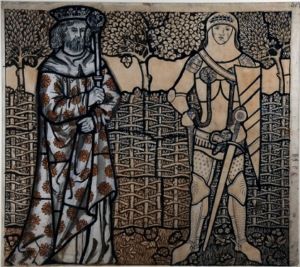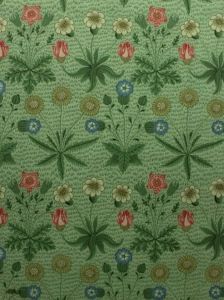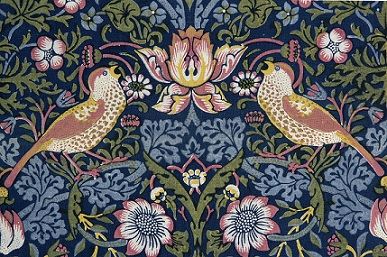When you’re used to the stringent aesthetic of Danish design, with its sparse interiors and predominantly white walls, the full-blooded explosions of colour this exhibition delivers can initially seem somewhat overwhelming.
But what if craftsmanship, ancient skills, a love of tradition, beauty, and natural, sustainable materials could all be combined into a whole that transcended all of these things? This was the somewhat ambitious goal of William Morris, the British artist born in 1834 who is profiled in a new exhibition at Nivågaard.
A multi-talent with a social conscience
Morris was a complex man – who as well as being an associate of the Pre-Raphaelite Brotherhood of painters, poets and art critics – was a poet, writer, illustrator, translator of ancient Icelandic texts, textile, wallpaper designer … and socialist.
A major influence on the British Arts and Crafts movement, he viewed the Medieval period before the painter Raphael as a golden age, where art developed in tandem with nature. Several of the works on display show this fascination with the Middle Ages.

He also fulminated against over-consumption and the shoddy mass production of the times, as well as being an advocate for the right of workers to free time, suitable working conditions and decent wages.
A contemporary resonance
Today, Morris is best known for his designs for wallpaper, tiles and fabrics, and all these areas are abundantly explored in this exhibition.
His designs feature abstract and intricately intertwined foliage, with fruits and flowers such as honeysuckle, lilies and daises. Fabric patterns such as ‘The Strawberry Thief’, inspired by the thrushes stealing strawberries in his garden at Kelmscott Manor, are still in production today. His ideas about sustainability, natural production methods and workers’ rights are also extremely contemporary.
“Apart from creating beautiful things, the greatest passion in my life has been and is a hatred of modern civilization,” he once said.
Putting the walls first
In April 1861, together with six other partners, Morris founded a decorative arts company, Morris, Marshall, Faulkner & Co. Their aim was to reinstate decoration as one of the fine arts, and they adopted an ethos of affordability and anti-elitism. As additional staff they employed boys from the Industrial Home for Destitute Boys in Euston – many of whom were trained as apprentices
When Morris came along, wallpaper was not common in private homes. He ended up putting 100 designs into mass production, of which 50 were drawn by himself. Three of his daughters – Mary, May and Jane – were also active as designers, both in wallpaper and textiles.
As he said: “Regardless of what else you have in your home, think of the walls first and foremost because it is them that create the house and home”.

‘Mass production’ is perhaps a bit of an over simplification because the process used by Morris involved cutting separate woodblocks to print each colour, sourcing all the pigments from natural ingredients and printing the wallpaper by hand.
In fact, he lost money on this and, maybe slightly ironically, it was mostly middle-class and well-off people who were able to afford his wallpapers until after his death, when the process was simplified and made cheaper.
Beautiful or useful
As well as the wallpaper, textiles and furniture, Morris founded the Kelmscott Press in 1891. The hand-printed edition of Chaucer published in 1896 with illustrations by Pre-Raphaelite artist Edward Burne-Jones is still regarded by bibliophiles as one of the most beautiful books ever printed in England.
Morris, who wrote and published over 40 books himself, became interested in the Old Norse Sagas – so much so that as well as taking a lengthy trip to Iceland, he taught himself Old Norse and translated some of the Icelandic Sagas.
Morris lived according to his premise that “everything should be beautiful or useful”. This exhibition certainly provides us with abundant evidence of his talents – and his philosophy.
















